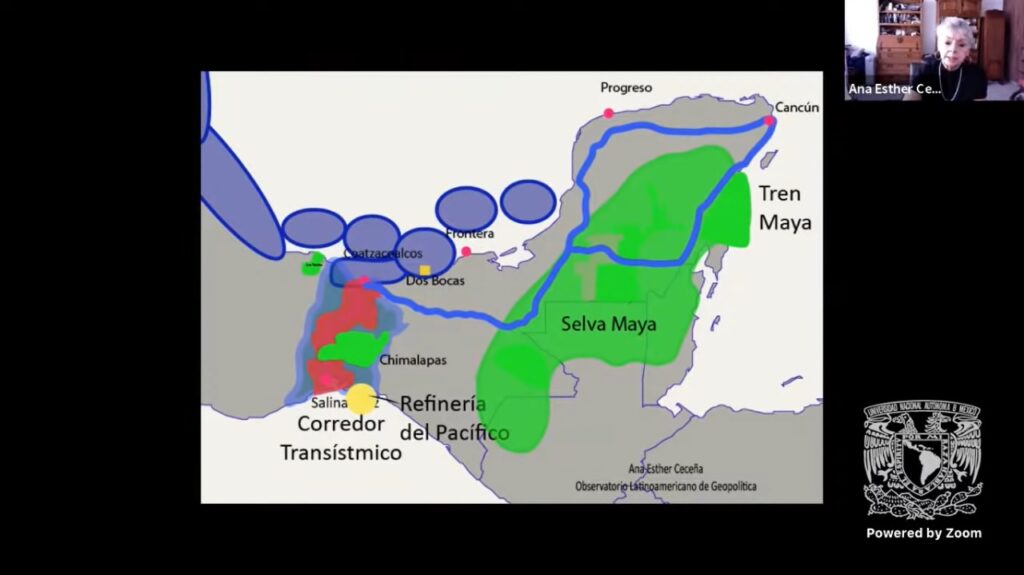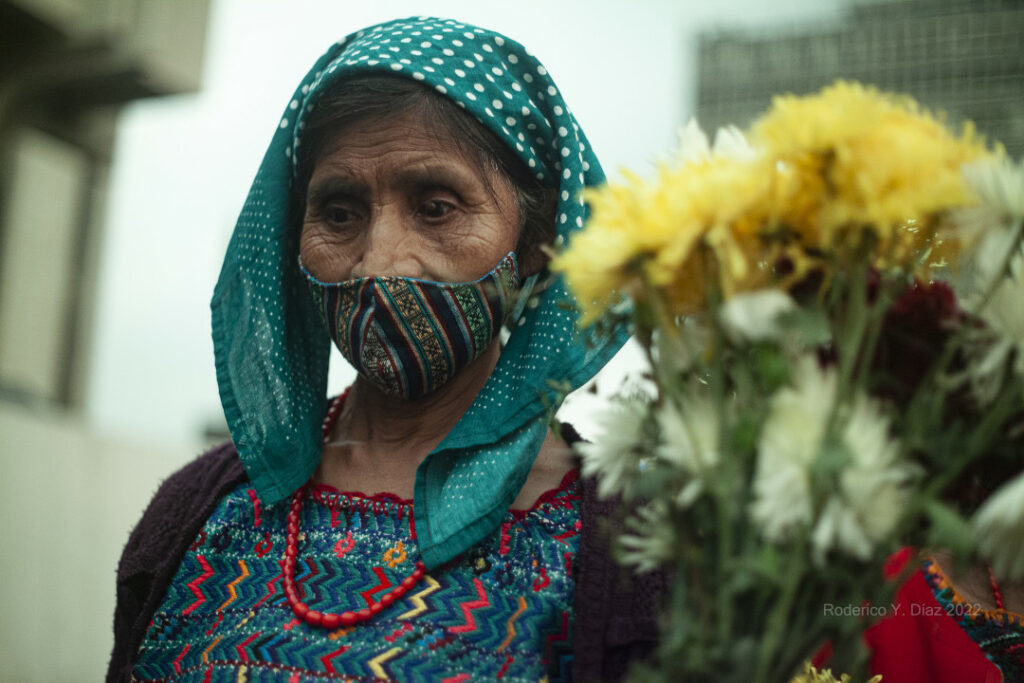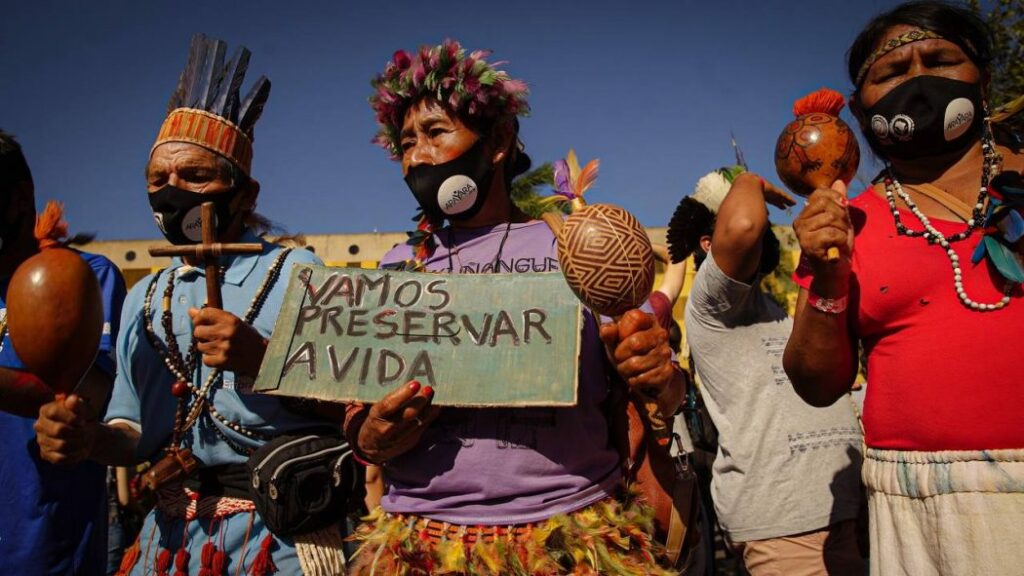
militarización
(Español) Tren Maya pasa por encima del marco legal, naturaleza y derechos humanos
Fuente: Avispa Midia
Por Jeny Pascacio
En portada: Ambientalistas protestan contra la deforestación provocada por las obras del tramo 5 del tren maya.
En el seminario Tren Maya: análisis de los impactos desde la academia, expertos de la Universidad Nacional Autónoma de México (UNAM) advirtieron, de nueva cuenta, sobre los riesgos más allá de las vías férreas, con mayor presión sobre los territorios y bienes culturales y naturales de la península de Yucatán.
“Por esta razón buscamos con este seminario visibilizar la opinión académica sobre la esencia del proyecto del Tren Maya desde una perspectiva efectiva ecológica, social y jurídica”, dijo la investigadora mexicana, Marisa Mazari Hiriart.
El proyecto se anunció en el 2018, días antes de que el presidente Andrés Manuel López Obrador (AMLO) llegara al poder. Desde entonces la comunidad académica se pronunció en una carta para detener la velocidad del plan.
Te puede interesar → Tras contradicción en el juicio, tribunal quita suspensión del Tren Maya
Los investigadores hicieron análisis de las primeras manifestaciones de impacto ambiental, además de solicitudes para discutir el tema con distintos organismos del Estado, así como para involucrar a la sociedad. Pero nunca hubo respuesta.
Hasta hace unas semanas, dijo el investigador del Instituto de Biología, Luis Zambrano, al recordar la campaña de artistas populares que no fue bien tomada por AMLO. “¿Dónde estábamos hace 30 años? Estábamos peleando por la selva Lacandona. Nada más nos descalifican y no hay paso adelante. Que nos ponga a platicar con quienes él considera que son ambientalistas y san, se acabó”, agregó el investigador del Instituto de Ecología, Rodrigo Medellín Legorreta.
No hay plan definido
El Tren Maya recorrerá una distancia de 1,500 kilómetros por los estados de Chiapas, Tabasco, Campeche, Yucatán y Quintana Roo, según la plataforma digital habilitada por el Fondo Nacional de Fomento al Turismo (Fonatur) para informar, de forma limitada, sobre el proyecto.
Para Medellín Legorreta, los trenes han sido subestimados y sub apoyados por todas las administraciones. La última inversión la hizo Porfirio Díaz en el siglo XX, aún cuando representan una gran posibilidad de detonar el desarrollo sustentable, “si se hace bien”.
Hasta ahora, dijo que no hay un plan definido, no es sustentable ni compatible con el desarrollo socioeconómico de la Península ni con el futuro de sustentabilidad desde el punto de vista de la biodiversidad o de los beneficios de los pueblos mayas.

Incluso, el proyecto incumple con el Marco Jurídico Ambiental, particularmente al no presentar un proyecto íntegro y no segmentado, amplió Gustavo Alanís del Centro Mexicano de Derecho Ambiental (Cemda).
Te puede interesar → Obras del Tren Maya llevan un año violando decisión de los Tribunales
Alanís dijo que no se conoce la compatibilidad del proyecto con los usos de suelo municipales, “pero de manera sorprendente ni el promovente ha dicho cómo cumplen”, en los cinco estados donde pasará el tren.
Península heterogénea
Cualquier megaproyecto debe ser planeado de acuerdo a las características del territorio, “el flujo del agua, como en cualquier territorio, va ser lo que permita la conexión entre ecosistemas”, dijo la también investigadora del Instituto de Ecología, Luisa Falcón.
Puso el ejemplo del corredor transversal costero del sur de Quintana Roo que representa flujo de agua tanto superficial como subterránea y permite la interacción e interconexión de sitios como Laguna Bacalar a través de una serie de canales de otras lagunas tanto en Chetumal hasta llegar al Mar Caribe.
“Entonces hay desplazamiento de un sinfín de especies muchas de ellas endémicas de la Península de Yucatán que van a desplazarse siguiendo estos flujos hidrológicos”. La región es frágil porque la geología es distinta, “es fantástica”.
Además, explicó que el 50 por ciento de sus manglares están a lo largo del litoral, por ello insistió “se tiene que hacer un proyecto que entienda perfectamente bien antes de ocasionar un mal mayor”.

En este entorno, Ana Esther Ceceña del Observatorio Latinoamerica de Geopolítica, consideró la importancia del peso de los dos trenes, de pasajeros y de carga, en un piso que es calcáreo y quebradizo, “no se han discutido los argumentos que llevamos tres años presentando”.
En el caso de Calakmul, Campeche, existe la cueva más importante de murciélagos en la región Neotropical. En términos de números, se trata del refugio de 3,000,000 quirópteros de mayores dimensiones desde el centro de México hasta Argentina.
Cada millón de murciélagos destruye 10 toneladas de insectos cada noche, aproximadamente. El 70 por ciento de estos invertebrados son plagas de la agricultura, expuso Rodrigo Medellín Legorreta.
“Si tiran eso me voy a ir con todo porque están destruyendo uno de los grandes aliados de la agricultura. Tengo entendido que cambiaron el trazo para pasarlo por detrás del cerro donde está la cueva lo que también va a traer montones de destrozos en un corredor donde sabemos que cruzan jaguares porque es la zona cercana a la reserva de la biosfera de Calakmul”.
En esta parte de Quintana Roo, del tramo cinco, tampoco hay Manifestaciones de Impacto Ambiental que puedan ser consultadas, para que los académicos puedan ver las medidas de mitigación que resuelvan las preocupaciones por el mega proyecto.
Te puede interesar → Urbes llegarán con Tren Maya en Yucatán; pueblos ven escenario desolador
Originalmente el trazo estaba planeado para ir entre las carreteras de cuatro carriles que conectan Cancún con Tulum, “luego resultó que, por los hoteleros, no por temas técnicos de ninguna manera, sino por la preocupación de los hoteleros se cambió el trazo para meterse cinco kilómetros dentro de la selva”, agregó Medellín.
La Alianza Nacional para la Conservación del Jaguar publicó artículos que demuestran que la mayor cantidad de jaguares de México están precisamente en la Península de Yucatán. Los investigadores dijeron que, incluso los pasos de fauna, tampoco están bien ideados.
Borrar la historia
En el 2019, el Instituto Nacional de Antropología e Historia (INAH) identificó 7,274 puntos de valor arqueológico en esa región. De acuerdo al Fonatur, cuando iniciaron los trabajos del primer tramo del Tren Maya se encontraron 5,300 hallazgos arqueológicos.
En el mapeo, no se muestran todos los vestigios arqueológicos, porque se descubrieron con el avance del proyecto del tren y, hasta ahora, no hay registro. Se trata de piezas pequeñas y grandes edificaciones que, a la fecha, pueden alcanzar las 13,000, descubiertas durante este proyecto de la “cuarta transformación”.

La investigadora Ana Esther Ceceña, consideró que los hallazgos continuarán en la medida que se vaya ‘rascando’ por la zona, “lo que está puesto en riesgo es de enorme importancia y dimensión desde todos los puntos de vista histórico-cultural”.
“Somos un país que en el momento de la conquista le fue borrada su historia y su historia se está recuperando a través de la experiencia de los pueblos, pero también de los hallazgos arqueológicos qué hoy están realmente amenazados”.
Lo mismo pasa con las poblaciones indígenas que habitan la región, pero al no estar reconocidas en las estadísticas no son consultadas ni visibilizadas, pese a ser parte fundamental de la conservación de la selva.
Ceceña agregó que, de los 68 grupos lingüísticos reconocidos por el Instituto Nacional de Pueblos Indígenas (INPI), 44 están en esta región que jurídicamente es indispensable que den su consentimiento para el Tren Maya.
Narcotráfico y migración
La académica Ana Esther Ceceña, sumó que no se cuenta con un estudio de factibilidad económica del proyecto, mientras la promoción que se hace del empleo está ligada a la propia construcción de las vías y no al resto de las actividades.
En la zona donde comenzaron los trabajos del tren, existe un incremento de 8% anual de personas asalariadas, pero se trata de trabajo temporal y precario “aunado a esta dinámica urbanizadora, tienden a disminuir la calidad de vida de las personas que están incorporadas”.
Dijo que la región es una de las zonas más ricas del país en la que se pueden generar proyectos sin dañar ni romper las condiciones de sustentabilidad; pero el Tren Maya fue anunciado como proyecto de urbanización.
Recordó que hace 40 años, Cancún tenía 3 mil habitantes y un territorio urbano de mil hectáreas que ahora se extendió a 13 mil, es decir “se comió el área donde se producían alimentos y eso tiende a aumentar la dependencia desde el exterior para la dotación de los mismos”.
Esto, a su vez, provoca intensificación de este tipo de actividades económicas, por ejemplo, la agroindustria que aumenta “el área de colonización urbana”, que contribuye a la contaminación del planeta.

Para la investigadora, a la situación social, económica y ambiental se agrega la presión de Estados Unidos con la política migratoria, pues la zona de detención justamente es la franja transístmica, “además de que Quintana Roo se ha convertido en una de las rutas importantes del narcotráfico”, con Estados Unidos y Europa, por el lado atlántico.
Te puede interesar → Empresas alemanas en “tren maya” refuerzan despojo y militarización
“En la medida que se va rompiendo el tejido social y la organización comunitaria con todo el contexto tiende hacerse más frágil la defensa de la población frente a estos grupos y quedan en manos del crimen organizado que promueve la trata de personas”.
Ceceña agregó que es un punto estratégico, “habría que imaginar qué pasa si de repente todos los grandes competidores o las grandes licencias del comercio mundial aparecen interesadas en este paso, ¿Qué va pasar con la región? ¿Vamos a entrar en guerra por el territorio o cómo se va diluir el problema?”, cuestionó.
Los investigadores coincidieron que el proceso de restauración ecológica será 10 o 20 veces más caro que la conservación actual del ecosistema, asimismo que el proyecto del tren transístmico que va de Salina Cruz, Oaxaca, a Coatzacoalcos, Veracruz, “hay que revisarlo porque también tiene serios problemas”.
(Español) Exterminio de los pueblos indígenas ha sido práctica en toda América Latina
Fuente: Avispa Midia
Por Jeny Pascacio
La discriminación, racismo y exclusión que sufren los pueblos originarios en América Latina por un contexto político y social ‘convulso’, violan los derechos y propician victimización individual y colectiva, por medio de la tortura, penas crueles, inhumanas o degradantes.
El estudio “¡Pues es tortura!”, promovido y coordinado por la Organización Mundial Contra la Tortura (OMCT) y el Centro de Derechos Humanos Fray Bartolomé de Las Casas (Frayba), rescata las vivencias y conocimientos de las personas que integran el Grupo de Trabajo Pueblos Indígenas y Tortura en América Latina: Argentina, Bolivia, Chile, Colombia, Guatemala, México y Nicaragua.
En los últimos años se multiplicaron los intentos en todo el continente de controlar la tierra, el territorio y a la propia población indígena en pro de la implementación de megaproyectos de desarrollo turístico, hidroeléctricos o extractivos y en detrimento de sus derechos fundamentales.
Te puede interesar → México: Escala violencia contra pueblos que resisten a megaproyectos
La tortura generalmente aparece ligada a otras formas de violencia, como la desaparición forzada, las ejecuciones extrajudiciales, la detención arbitraria y la violencia sexual con base en el género, para mencionar algunas.
“Efectivamente, con este informe se ha podido demostrar cómo la tortura tiene un impacto más allá de lo individual y afecta colectivamente la identidad, la cultura y el ámbito político-organizativo de los pueblos y comunidades”.
Este estudio se enfocó en tres variables: la persistencia del racismo institucional y estructural como “caldo de cultivo” que ha permitido y potenciado que se cometan actos de tortura y malos tratos en total impunidad; las violencias sociales, políticas y económicas a través de la militarización, el endurecimiento de las políticas de seguridad nacional y las leyes anti-terroristas, que vulneran cotidianamente los derechos de los pueblos indígenas; y la violencia en torno a la tierra y el territorio que se manifiesta en el despojo histórico y la usurpación de sus territorios ancestrales.
En América Latina habitan 58,2 millones de personas indígenas, lo que representa el 10% del total poblacional; las mujeres representan el 50,8% de la población total, según la Comisión Económica para América Latina y el Caribe (CEPAL) con datos de 2018.
Por ello, analizaron el contexto de los siete países donde los pueblos originarios enfrentan tortura por despojo de tierras; protesta social; la criminalización, la estigmatización y las amenazas contra los líderes y las lideresas indígenas; en el contexto de detención o cárcel y a través de actos de violencia sexual y con base al género, en especial en contra de las mujeres indígenas.

Despojo
El estudio da cuenta que el despojo de tierras y bienes puede representar tortura o malos tratos y señalan a autoridades estatales y grupos criminales armados como responsables.
“En estos casos, los Estados incumplen generalmente con sus obligaciones de protección conforme al principio de debida diligencia. Este despojo se da en muchas ocasiones para permitir que empresas y megaproyectos se instalen en territorios indígenas sin consulta previa, primando los intereses económicos y comerciales”.
Estas estrategias provocan desplazamientos, violencia, intimidación y uso excesivo de la fuerza. A su vez afectan a los pueblos originarios en su colectivo, tanto en el ejercicio de sus derechos a la tierra y el territorio como en su cosmovisión, espiritualidad y reproducción social y cultural.
Las mujeres también se enfrentan a altos índices de violencia sexual, a la que se le agrega la tortura que el agresor o los agresores efectúan en el contexto de la detención a través de golpes en partes sensibles del cuerpo de las mujeres, manoseos, desnudez forzada y violencia sexual.
A esto se le suma la represión estatal a partir de la tortura y malos tratos por la protesta social vinculada en América Latina a la defensa de la tierra, el territorio y el medio ambiente, que ha dejado numerosas personas muertas y heridas a lo largo y ancho de todo el continente.
Te puede interesar → Crisis climática y violencia contra defensor@s del territorio se intensifican
El caso de la criminalización, estigmatización y detención de defensores de derechos humanos indígenas se repite en todos los países de la región latinoamericana. La investigación registró el encarcelamiento de 12 personas con denuncias falsas y persecución laboral que muchas veces han terminado en actos de tortura física y psicológica mientras están privados de libertad.
“La cárcel se presenta como un entorno torturante que, en sí misma, afecta de manera específica a las personas indígenas, no solo por las deficientes condiciones de detención, pero también por la falta de consideración de los elementos específicos que respeten al máximo posible sus tradiciones y cosmovisión en el marco de la privación de libertad”.
Discriminación
La región cuenta con una gran diversidad lingüística y cultural, con 424 lenguas distintas (incluyendo castellano, portugués, francés e inglés) de las cuales 107 (el 24,5%) son idiomas transfronterizos que se utilizan en dos o más países. Al mismo tiempo, es la región con mayores desigualdades en el mundo, según CEPAL.
Y son, precisamente, los Estados latinoamericanos que enfrentan a altos índices de discriminación por razones de género, etnia, lengua y clase que dificultan más el acceso a la justicia.
“La clasificación social en ‘razas’, algunas de ellas ‘superiores’ a otras”, remonta al periodo colonial y fue heredada en los procesos de independencia y/o consolidación de los Estados-nación con el propósito de imponerse políticamente, homogeneizar culturas (y en ocasiones erradicarlas) y despojar a los pueblos originarios de sus territorios”.
En América Latina el racismo, profundamente enraizado en los sistemas judiciales, políticos y sociales, permiten las violaciones a la prohibición absoluta de la tortura y otros malos tratos en el caso de los pueblos indígenas.
Por ello, tienen un impacto grave en la vida individual y colectiva de los pueblos indígenas. La investigación del Grupo de Trabajo y Frayba señala que en Guatemala se forjó un modelo que racializó al sujeto “indio”, despojándolo de su condición de sujeto de derecho, el cual debía ser “civilizado o civilizada” para su integración a la sociedad en general y para ser considerado “ciudadano” o “ciudadana”.
Nada contrario de lo que sucede en Bolivia, donde el proceso histórico de construcción del Estado se caracterizó por la dominación de la minoría mestiza-criolla y la exclusión de los indígenas del aparato estatal.
A pesar de que la Constitución de 1991 reconoció los derechos colectivos de los pueblos indígenas como fundamentales en Colombia, no existe una transformación real de las precarias condiciones de vida de los pueblos indígenas, como tampoco la superación de la desigualdad.
Mientras, en Nicaragua, los pueblos indígenas del Pacífico, el centro y el norte resisten los procesos de dominación y de asimilación cultural forzada, impuestos desde la colonización española por el Estado nacional, y que tienen como común denominador su invisibilización, la negación de sus identidades, tradiciones e historia.
En el caso de las poblaciones indígenas y afrodescendientes de la Costa Caribe –cuya extensión constituye la mitad del territorio nacional nicaragüense-, son objeto en la actualidad de una violenta colonización interna.
En México se repite el mismo patrón con un limitado reconocimiento constitucional de los derechos de los pueblos indígenas, particularmente en lo relativo a la autonomía y libre determinación, presentan una continuidad temporal en lo relativo a la discriminación estructural que existe desde la época colonial.
En este contexto, la tortura en la cárcel, por ejemplo, “se caracterizan por la fabricación de confesiones o declaraciones autoinculpatorias, a través de tortura, aprovechándose de la marginación, pobreza y del desconocimiento del castellano por parte de las personas indígenas detenidas”.
“El racismo sigue profundamente enraizado en la cultura latinoamericana, permeando sus sociedades de manera estructural, lo que se ha reproducido a través de sus diversos sistemas económicos, políticos, sociales y jurídicos y ha traído consigo la marginación, exclusión e invisibilización política y social de los pueblos originarios”.
Esto sin descartar que, en AL, el 6% de las personas no cuentan con una vivienda, y aunque la tasa de alfabetización de la población entre 15 y 24 años de edad es del 98,2%, un 8% de la población total no sabe leer ni escribir. El acceso al agua y al saneamiento aún no es universal: el 7% de la población no tiene acceso al agua potable (más de 45 millones de personas) y el 12% carece de saneamiento adecuado.

Leyes
En general, los derechos de las personas indígenas son reconocidos, pero no materializados en casi todas las Constituciones latinoamericanas.
En México, para que el despojo de los territorios ancestrales se lleve a cabo, la militarización juega un papel fundamental; y ha sido una de las problemáticas que ha desatado mayor preocupación en derechos humanos.
“Una guerra directa entre cárteles de la droga y el gobierno federal ha traído consigo asesinatos, desapariciones y desplazamientos forzados de miles de personas en el marco de esta estrategia”.
Te puede interesar → En un país militarizado, ¿Quién vigila a la Guardia Nacional?
Por ello, organismos internacionales, como el Comité contra la Tortura de las Naciones Unidas (CAT), han expresado la preocupación de la seguridad pública recaiga en las autoridades militares.
Entre 2018 y 2019, Chile y Argentina endurecieron las políticas de seguridad nacional. Por un lado, en Argentina se consideró como un problema de soberanía nacional la existencia del pueblo Mapuche, aumentando el hostigamiento y la criminalización contra el ejercicio de los derechos culturales.
El informe tiene registro de la creación de comandos especiales para combatir la resistencia Mapuche que incrementan la violencia estatal, las detenciones arbitrarias, los montajes judiciales, las privaciones arbitrarias de la libertad, el espionaje, las desapariciones forzadas, la tortura, el uso desproporcionado de la fuerza y los asesinatos.
El pueblo Mapuche en Chile también enfrenta un Estado que aplica de manera discriminatoria la Ley Antiterrorista, criminalizando la protesta social del pueblo originario y somete a largos periodos de prisión preventiva a varios de sus líderes y lideresas.
En este tenor son comunes la falsificación y el ocultamiento de pruebas ante los tribunales para condenar a dirigentes y autoridades tradicionales, y se han realizado muchos operativos policiales violando las normas internacionales y nacionales que regulan el uso de la fuerza.
En Colombia, la población ha vivido un largo conflicto armado que data de la década de los años 50; sus causas inician en la desigualdad en el acceso a las tierras y en la inequidad social y económica.
A esto se le agrega la dinámica del paramilitarismo que, aunado al narcotráfico, con el pretexto de la lucha contrainsurgente, es responsable de graves masacres y desplazamiento forzado como estrategia para el despojo de tierras.
El caso nicaragüense tiene antecedentes de décadas de abuso y discriminación, agravados con el desmantelamiento de la institucionalidad democrática y que se agudizaron con la llegada al poder en 2007 del presidente Daniel Ortega, bajo cuyo gobierno se cometieron los primeros abusos en áreas rurales contra campesinos e indígenas por parte el Ejército.
Mientras, los pueblos indígenas en Guatemala han pasado por épocas históricas que han marcado su existencia, condición y situación de desarrollo social, económico y político. Como ejemplo el periodo del conflicto armado interno de 1960-1996 cuando se cometieron graves violaciones de los derechos humanos y crímenes internacionales que llegaron a ser calificados como genocidio por los tribunales.
“A ello se añadieron masacres, torturas, desapariciones forzadas, actos de esclavitud y violencia sexual cometidos por y desde el Estado”.
Protección
La falta de investigación, juzgamiento y sanción a los responsables de tortura y los tratos crueles, inhumanos y degradantes (TCID) provocan daños inmateriales, morales o psicológicos, en lo individual y colectivo a los pueblos originarios.
Las recomendaciones de la investigación justamente parten de este racismo que se propaga desde el poder, ante la urgencia de que se aplique el marco internacional y nacional de prevención y erradicación de la tortura y otros malos tratos desde una perspectiva colectiva, diferenciada y cultural, que proteja y prevenga la violencia contra los pueblos indígenas.
El Grupo de Trabajo y Frayba emiten recomendaciones específicas para los mecanismos de derechos humanos de las Naciones Unidas y del Sistema Interamericano, los Estados individualmente considerados, y al movimiento de derechos humanos contra la tortura, en específico al Comité contra la Tortura de las Naciones Unidas (CAT).
En ellas piden tipificar a nivel nacional la tortura y los malos tratos de acuerdo con los estándares internacionales y particularmente incluyendo el motivo de la discriminación como uno de los propósitos básicos de la definición de tortura. Asimismo, garantizar que en todos los espacios y mecanismos anti-tortura haya una pluralidad de voces y de experiencias y representación de jóvenes, mujeres y hombres.
Las organizaciones solicitan una elaboración de observaciones generales o informes de fondo a nivel de las Naciones Unidas y el Sistema Interamericano sobre las particularidades de la tortura en los pueblos indígenas, analizando las obligaciones de los Estados de garantizar la prevención, protección y reparación por los actos de tortura desde un enfoque colectivo, diferenciado y cultural.
Al movimiento de derechos humanos contra la tortura y los malos tratos, recomiendan fomentar la formación de personas indígenas en el conocimiento del derecho a nivel nacional y del derecho internacional de los derechos humanos.
El estudio de 120 páginas documenta que la tortura contra los pueblos indígenas ha sido una práctica generalizada en América Latina, utilizada no solo en contextos de conflicto armado sino de manera permanente, en correspondencia con intereses individuales, particulares o privados (por ejemplo, de empresas naciones y transnacionales).
“Los pueblos indígenas la perciben como una forma de exterminio y extinción de sus pueblos. De tal manera, los pueblos indígenas vienen vivenciando importantes formas de tortura a causa de sus luchas por consolidar su propio proyecto político y de desarrollo, cuya fuente principal es el territorio. Y es en torno al territorio que actúan intereses estatales, ilegales y transnacionales, poniendo en alto riesgo la vida y la pervivencia de muchos pueblos indígenas”.



